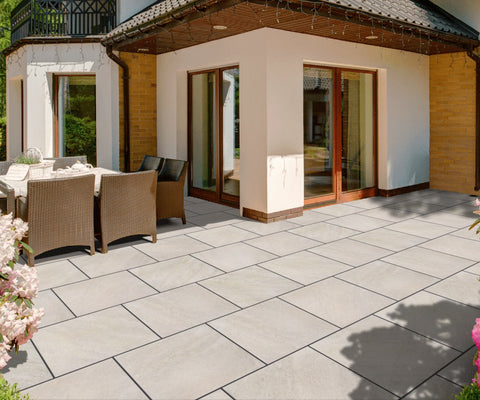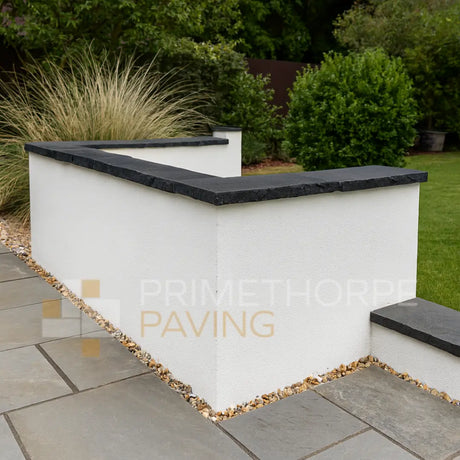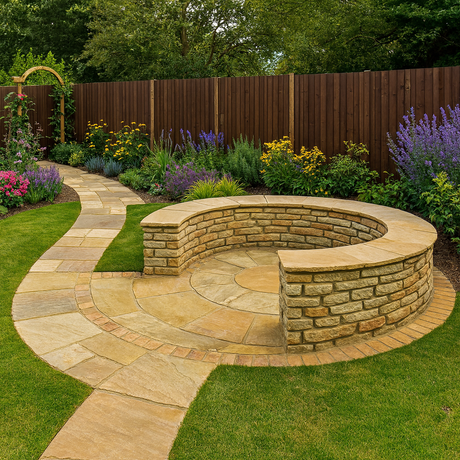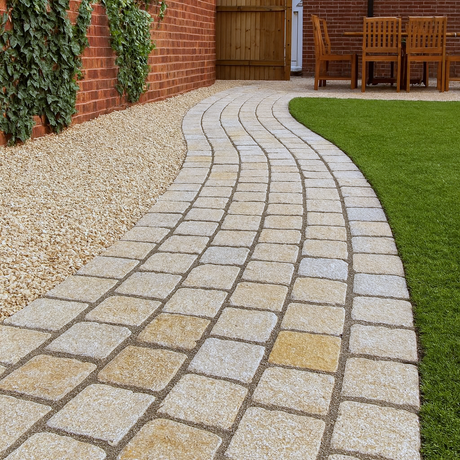Polished (Or honed) sandstone is going through a period of immense popularity. If you take one look at the honed patios online or in a brochure, it's easy to buy into their beauty. The clean lines, straight edges and smooth surfaces look like the perfect, modern stone for your garden project. But sadly it's becoming more and more obvious that the brochure images are far from the reality of owning and maintaining a honed patio.
Think of the last food advert you saw... did that burger look like that when you received it? Very unlikely. While that burger still may have tasted great, the chances are you are not planning to eat your patio... so the way it looks is the only thing that matters, and we are starting to see multiple reports that in a matter of weeks (or even days), the beautiful honed slabs no longer look like they did when they were first installed.
There are some problems with polished smooth Indian sandstone slabs. If you are considering smooth paving slabs for your patio or garden paths, it is important you are aware of the problems that can occur. Indian sandstone is relatively soft and porous and honing the stone opens up these pores even more, meaning you are getting the softest version of an already soft stone.
The Ultimate Problems With Honed Sandstone
The main selling point of a honed sandstone is also the reason it's not really suitable for it's purpose. When brand new, the slabs are perfect. They are smooth all-around with very few imperfections or blemishes. But this means that when the weather and elements have had their way with them, they will deteriorate like anything else left outside. But when a honed slab deteriorates, it's instantly noticeable and ruins the effect of the entire patio.
We've compiled a list of things to consider when purchasing honed sandstone, most come down to ruining the aesthetics, but the whole list is worth considering:
It Will Absorb a Lot of Moisture
Smooth Indian sandstone slabs are known to be a relatively porous material. In some cases, it will have an absorption rate of between 1% and 6%. This means that sawn and honed grey sandstone paving is left extremely vulnerable to damage from liquid stains, mold and micro-bacteria like lichen or algae.
Scuffs & Scratches Will Show Up
All natural stone patios will scuff and scratch when installed for use as a patio - this is fairly obvious I would think! But honed paving suffers particularly badly.
While smooth Indian sandstone is a rock, it is a relatively soft rock. Unfortunately, this means that your smooth grey paving stones will be subject to scratches and dents over time. This damage can be caused by animal claws, high heels, patio furniture or even accidents that result in items crashing to the floor.
Once scuffed and scratched, the beautiful honed patio will lose much of the effect you created when it was installed.
They Will Be More Slippery Than A Riven Option
Sawn and honed grey sandstone paving is perfectly flat and while it has some traction it can be very slippery underfoot when it gets wet. Meanwhile, polished sandstone paving can present a particularly dangerous slipping hazard. This is even more so the case for areas of the patio where water may be present - and in the UK for 80% of the year, that is most of it!
In this instance, it is sensible to consider a traditional sandstone which is naturally grippy underfoot.

Kandla Grey Sandstone Paving - Take a Look!
Sandstone Is Very Liable To Staining
Due to the high absorption rate of polished sandstone, it means that coloured liquids can quickly penetrate down into the paving stone. If the coloured liquid spillages are not caught early enough this can lead to permanent stains deep into the paving.
Stains on regular sandstone can be bad enough, but when you soften the stone even further by honing it, it almost starts to act like a sponge.
If stains are at the very top of your priority list, then you should consider an outdoor porcelain. These porcelain paving slabs do not stain and look good for years.

Vesuvio Beige Outdoor Porcelain - Shop Here
Sandstone Will Eventually Weather
Even with perfect care and maintenance smooth Indian sandstone slabs will not look as good as they did when they were first installed. The sandstone is too soft and with regular foot traffic, general wear and tear along with the elements and exposure to the atmosphere, the smooth paving slabs will discolour over time.
With a riven stone, not all of our customers see this as a drawback as the weathered colour is still very attractive. However, with a honed stone, it often takes away from the effect that you purchased it for. Riven is more sustainable and long-lasting than a honed patio, in almost every way.
Is Honed Sandstone Right For You?
Alternatives to Honed Indian Sandstone
We understand, there are such stylistic benefits to using a smooth, perfect natural stone. But in our opinion, these things just aren't worth the risks. It's understandable if we were talking about a lick of paint, or curtains for example. But this is a very laborious, very permanent job that is supposed to last a lifetime if you wanted it to, and that's where the issue without honed slabs comes to a head.
They might look perfect when first installed, but become very difficult to appreciate after a few years of wear-and-tear. So what are some alternatives? If you want that perfect/smooth finish, without the issues of deterioration, then we would suggest going for a porcelain tile.
New outdoor porcelain paving has all the benefits of a honed slab, but they don't decay over time. They will look brand new whenever you get them cleaned up. The best of both worlds!
Our "Honed Concrete" style porcelain pavers are a great example of a smooth looking slab that will not deteriorate.

Honed slabs should be avoided where possible
While this piece is a fairly damning report on Honed Sandstone, there is a reason for its popularity. Ultimately, it is a very good looking stone and if you absolutely love the style, then go for it. It's certainly not a sub-standard material that will instantly fail - we just wanted to make the limitations as clear as possible.
If you’re not sure of the best paved area for your garden, call or contact our team. We will take the time to understand your garden goals and recommend the right paving material to suit your needs and requirements. Every garden is different, and every homeowner is different. We help you find the perfect paving slabs that meet your needs and the style of your garden.






